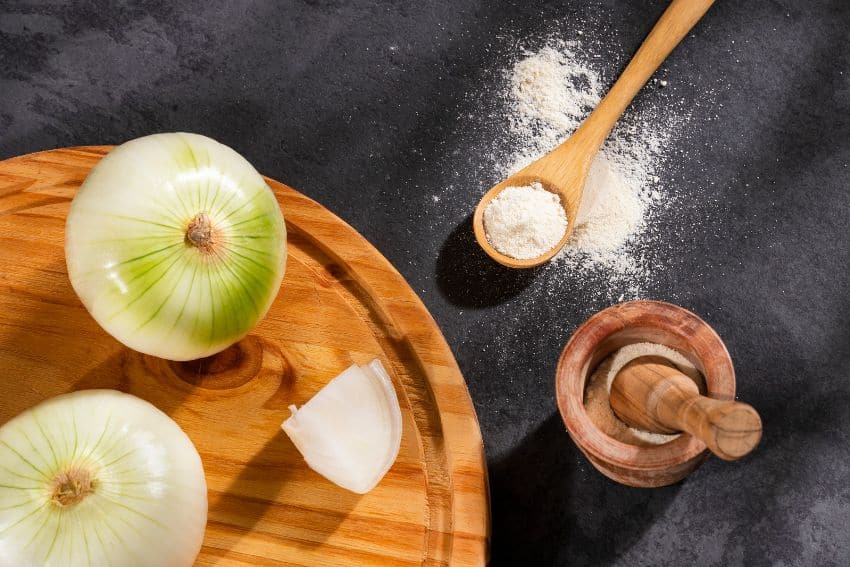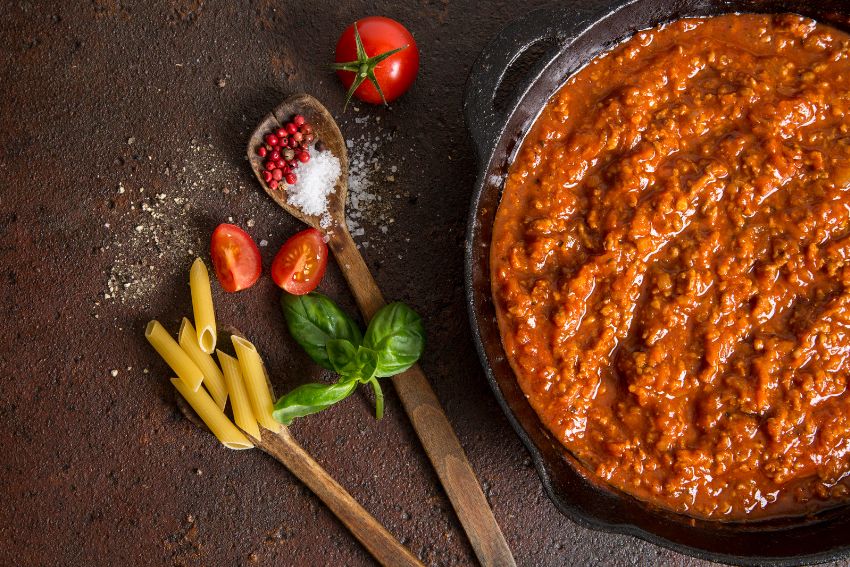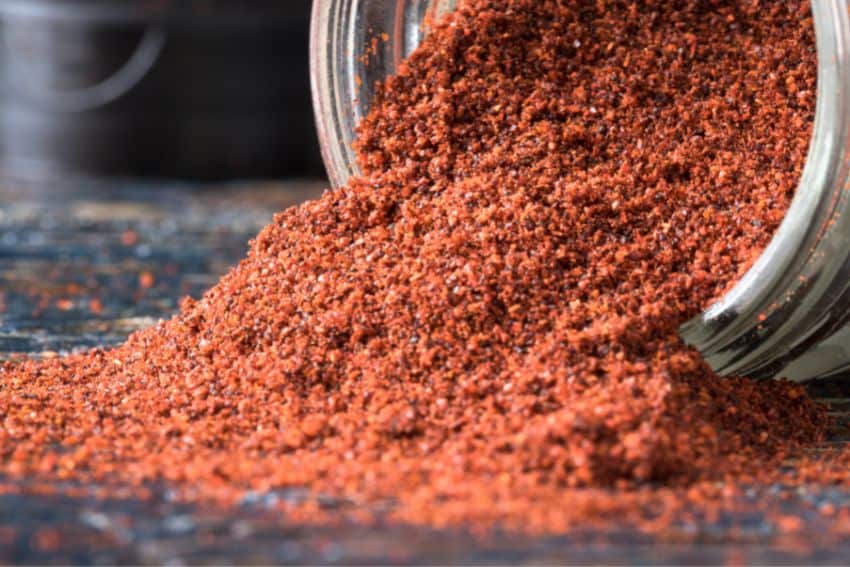Onion powder is one of the most common ingredients in America used for soups, dry rubs, salad dressings, and marinades. However, if you ever need a substitution for onion powder in a pinch, then look no further!
I have listed the 15 best substitutes for onion powder, based on their taste, texture, and overall application in recipes.
Outline
15 Best Substitutes for Onion Powder
1. Onion Flakes
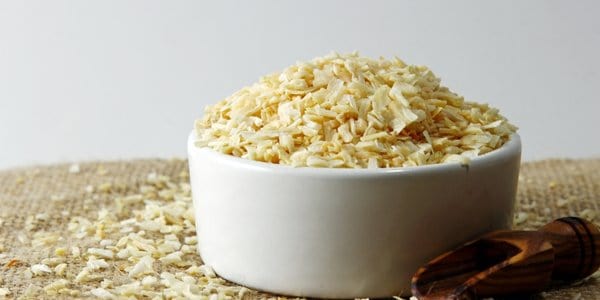
Starting off with arguably the best substitute for onion powder, onion flakes are a near-identical replacement.
Both onion powder and onion flakes are made from dehydrated onions. The major difference is the fact that onion powder is essentially onion flakes that has been ground down into a fine powder. Onion powder has a more concentrated flavor than onion flakes, while the latter adds a crunchy texture to any dish. However, they taste the exact same.
A thing to remember when using onion flakes is that it absorbs moisture, leaving you with a drier dish. Remember to add more water to your dish than you normally do when compared to when you use onion powder.
How to Substitute:
3 tablespoons of onion flakes can substitute 1 tablespoon of onion powder.
2. Jarred Onions
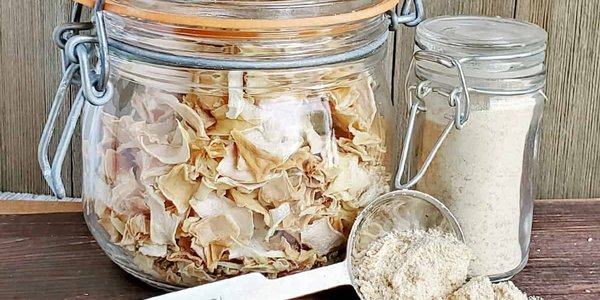
Similar to the last entry, jarred onions are essentially pieces of dehydrated onion. However, jarred onions are of a more finely chopped variety.
The usage of jarred onions is very similar to that of onion flakes. If you felt like the texture and the bite of onion flakes tend to ruin your dish, you can instead opt for jarred minced onions that are smaller and equally chopped. Keep in mind that since they are also dehydrated onions, they soak up moisture from the dish. Compensate this by using more water.
If you want to forego this process, you can reserve jarred onions for recipes like stir-fries and salads.
How to Substitute:
1 tablespoon of jarred onions can substitute 1 tablespoon of onion powder.
3. Fresh Onion
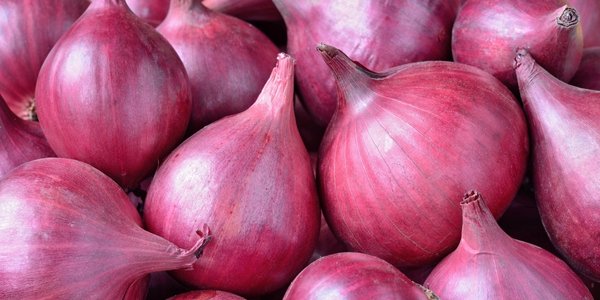
Another great, and probably an obvious choice when it comes to substitutions, is freshly chopped onions. Selecting the fresh option generally proves to be the healthiest option.
Aside from choosing the kind of onion you want, freshly chopped onions add a sharper taste to your dish. A recipe can sometimes be enhanced with the addition of the crunch which comes with fresh onions, that the powder simply cannot provide. However, the latter is much more concentrated than fresh onions, so you would need to adjust the number of onions you use accordingly.
Onions also contain a lot of moisture, which gets released upon cooking. Onions caramelize and soften up when cooked through. This means you can make your dish mushy if you aren’t paying close attention. Make sure you dry your chopped onions as much as possible before using them as a substitute.
How to Substitute:
1 cup of freshly chopped onions can substitute 1 tablespoon of onion powder.
4. Onion Salt
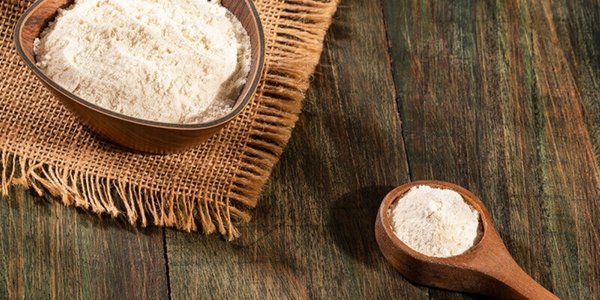
Onion salt is an excellent choice for a substitution, mainly because one of its components is onion powder itself. It is onion powder mixed with salt, giving it a lighter color and a texture similar to the former.
Keep in mind that the proportion of salt in onion is still pretty high. Since salt accounts for almost 75% of the mixture, you’ll need to adjust (if not outright exclude) the amount of salt you would have used in your recipe.
The application of onion salt can be both as a substitute for onion powder, and as regular salt with a sharpness of onion in dishes like soups, salads, stews, marinades, dry rubs, etc.
How to Substitute:
Onion salt can substitute onion powder in a 1:1 ratio.
5. Shallots
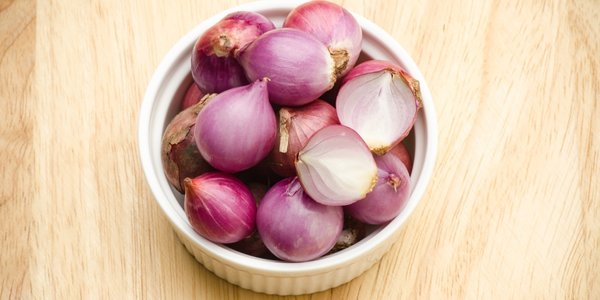
Shallots are part of the onion family, with characteristics of both garlic and onion. Some people might even use these as a substitute for onions itself. Afterall, they look like mini versions of large onions!
Shallots are generally less sharp, with a hint of sweetness. In terms of flavor and texture, shallots have both traits of onions and garlic. Whether you choose to fry it, cook it, or eat it raw, shallots provide a burst of flavor you would have gotten from onion powder. You can find them in most markets keeping ingredients for Asian cuisines.
They are easy to spot, with their outer skin ranging from deep red to a pinkish color, while their insides are white with traces of green. Note that since shallots aren’t as sharp as onions, the taste will vary from onion powder. You can use shallots in stews, soups, pastas, marinades, and so on.
How to Substitute:
2 medium-sized shallots can substitute with 1 tablespoon of onion powder.
6. Garlic Powder
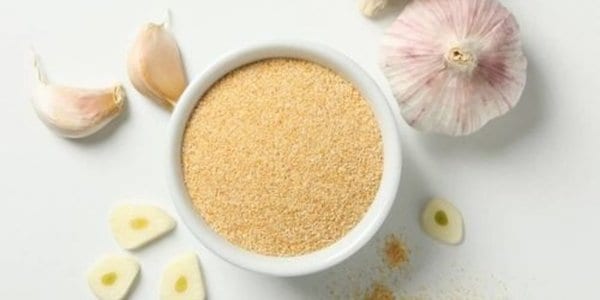
If the dish you chose calls for onion powder, chances are it will also require garlic powder. These two ingredients are common additions to meat rubs and marinades, and the latter can certainly be an excellent substitute for the former.
Being in the same “allium” family, garlic powder and onion powder can be found on the shelf for their similar taste. However, a major difference between the two is that garlic powder is much more intense in terms of flavor and aroma when compared to onion powder. If you’re using garlic powder as a substitute, remember to use less of it.
How to Substitute:
Garlic powder can substitute onion powder in a 2:1 ratio.
7. Chopped Chives
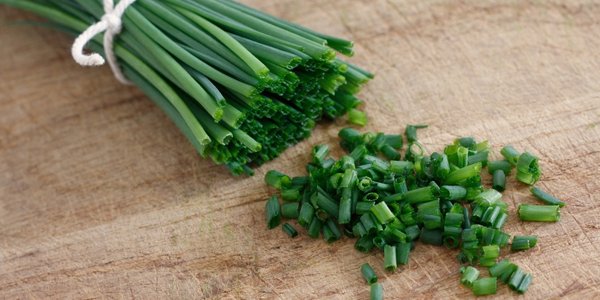
If your recipe calls for the same onion flavor as onion flakes, but you still need the same crunch in its texture, chopped chives will fill that niche perfectly.
Chives are also part of the “allium” family which means they possess a flavor profile similar to onions. However, chives don’t fare well in fried or dry dishes. Their main application has mostly been for garnishing. So if you want a replacement for onion powder in your soups, salads, stews, and so on, then chives will definitely be a good choice.
Chives have a much milder taste than onion powder, so remember to use more in order to compensate.
How to Substitute:
1 bunch of chopped chives can substitute 1 tablespoon of onion powder.
8. Scallions (Green Onion)
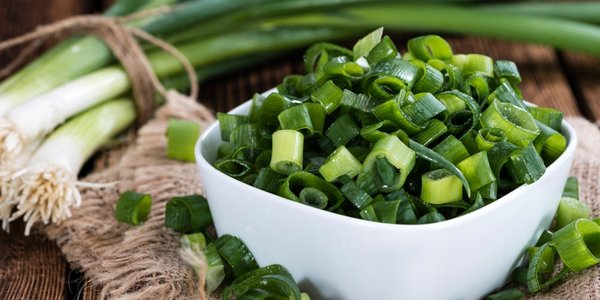
Keeping in line with the trend of substitutes for onion powder that present a change in texture, scallions (green onions) function similarly to chives.
Scallions are spices that are harvested early. This makes them incredibly hard to store and preserve, so I advise eating scallions the day you buy them. Scallions are easy to add since everything from the bulb to the stem is edible.
Green onions synergize well with both hot and cold dishes, and are an excellent addition or garnish for pastas, and meat-based dishes like pork, soups, dips, etc. Scallions have a sweeter and much milder taste compared to onion powder. Like chives, use more of them in order to use them as a substitute.
How to Substitute:
3 tablespoon of scallions substitute 1 tablespoon of onion powder.
9. Fennel Bulbs
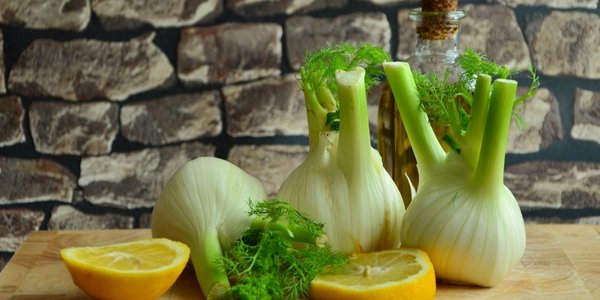
While not my go-to option in terms of substitution for onion powder, funnel bulbs definitely help fill the need for a similar flavor profile. Fennel bulbs have a taste that can be described as bitter with a slight hint of sweetness. The real reason people use fennel bulbs in their dishes is because of their intense aromatic properties.
Using fennel bulbs raw will give you a crunchy texture, but cooking it will make it soft and silky. Every part of this plant is edible, but most recipes prefer to cook fennel bulbs when using them with meat or vegetables. Otherwise, they can act as a great addition and garnish to salads and stews. Fennel bulbs contain a lot of moisture, so adjust the water content in your dishes accordingly.
How to Substitute:
1/2 tablespoon of fennel bulbs can substitute 1 tablespoon of onion powder.
10. Leek
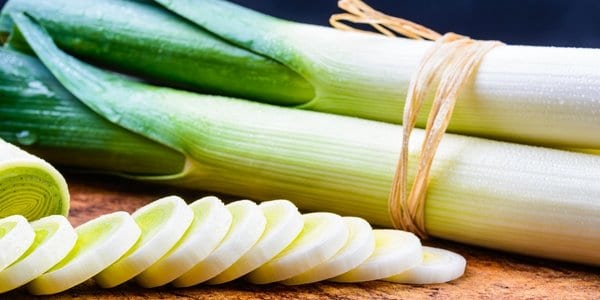
Similar to some of the other entries, leeks are related to the onion family tree. Despite that, leeks have a flavor profile that can be described similar to that of onion powder.
The best way to describe its taste would be to say it’s “oniony”, while it is aromatic much like fennel bulbs. Leeks resemble scallions with their white stem and green leaves, but they are noticeably thicker and tougher to chew. The “oniony’ taste has a mild sweetness to it.
While you can eat leeks raw, people usually put them in soups, sauces, pasta, etc. where they get a chance to get cooked so that they are easier to eat and unlock their aroma better.
How to Substitute:
1 cup of leeks can substitute with 1 tablespoon of onion powder.
11. Celery
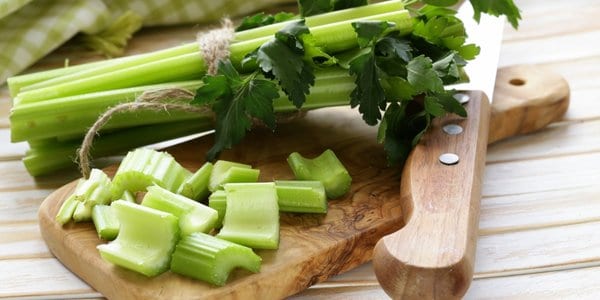
In contrast to the other entries on this list, celery is not related to the allium family of onions. Regardless of this, celery is considered to be a viable substitution for onion powder for it’s flavor profile and aroma.
Also unlike some of the other entries, the flavor of celery is “oniony” enough to replace onion powder directly. Granted the taste is not as sharp, but for people who want the taste of onions without the sharp bite, celery is a viable substitute.
As is true for all substitutions that are high in moisture, remember to use less water when using celery in your dish. Celery can go on salads, pastas, sandwiches, etc., and you can use them raw after a thorough washing. As mentioned earlier, celery is a strong aromatic too.
How to Substitute:
Celery can substitute onion powder in a 1:1 ratio.
12. Onion Paste
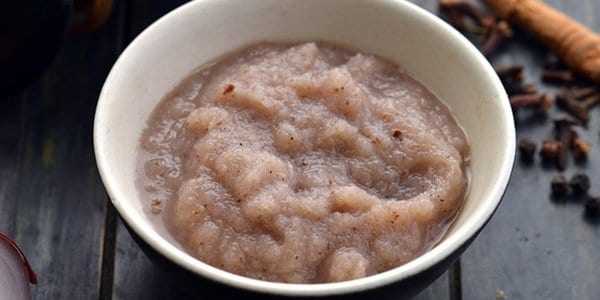
Making onion paste in your own kitchen is not a tough job at all, considering it is nothing but pureed onions. If you’re like me and you keep forgetting that one small bulb of onion in the corner of your fridge, you can now use leftover onions as a handy substitute for onion powder.
Since you need to make a puree, all you have to do is put some roughly chopped onions in a food processor or a blender till it resembles a thick smoothie. Set it in ice trays and cover it with a sheet of plastic and freeze them over time. These cubes of onion paste will last you a long time, and you can accurately decide how much onion flavor your dish needs.
Onion paste contains a lot of moisture, so adjust the water in your dish accordingly.
How to Substitute:
1 tablespoon on onion paste can substitute 1 teaspoon of onion powder.
13. Onion Granules
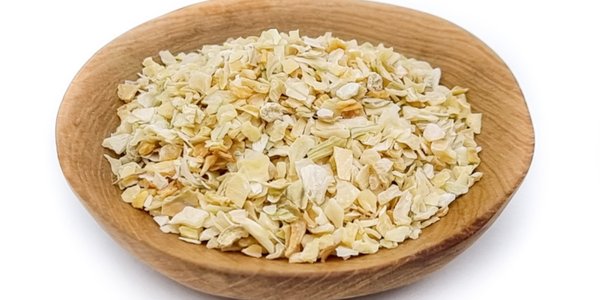
Similar to onion flakes, onion granules are functionally similar to onion powder. The main difference between the two comes down to texture.
While onion granules are also dehydrated onions, their texture is much more coarse than onion powder. They are might be larger than onion powder, but they are still smaller than onion flakes. Onion granules can be used in any dish that calls for onion powder, and if you wanted a little more crunch to your dish.
How to Substitute:
2 tablespoons of onion granules can substitute with 1 tablespoon of onion powder.
14. Black Garlic Powder
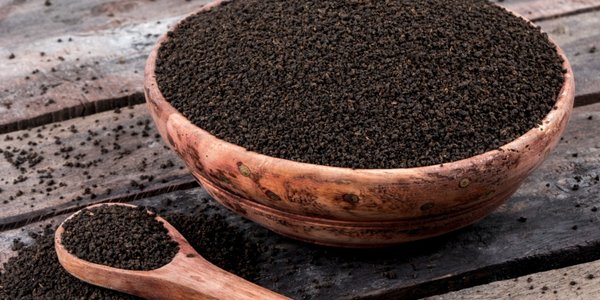
This might be an option people may not have considered, but black garlic powder works just as well as a substitute for onion powder.
One of the components of this powder is onion itself, while its flavor profile can be described as umami. It has a slight hint of sweetness that is similar to soy sauce, and bittersweet. Black garlic powder can be an excellent addition to meat rubs and marinades.
How to Substitute:
1/2 tablespoon of black garlic powder substitutes 1 tablespoon of onion powder.
15. Garlic Salt
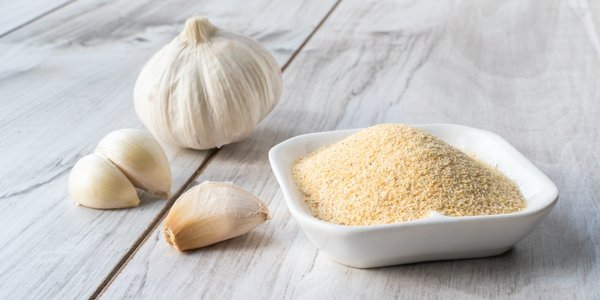
Similar to one of the other entries on the list, garlic salt is made with garlic powder and salt.
For the very same reason, you’ll need to adjust the amount of salt you use in your recipe. Garlic salt is 3/4 salt, which means it has a high sodium content. If you’re avoiding sodium, or don’t want your food to be too salty, keep an eye out for how much garlic salt you use. Garlic is also much stronger than onion in terms of flavor.
Garlic salt can be added to meat rubs, sauces, dips, and marinades.
How to Substitute:
1/2 tablespoon of garlic salt can substitute 1 tablespoon of garlic salt.
Conclusion
Onion is a staple ingredient and aromatic for several cuisines. Onion powder is an essential addition to several dry rubs, salads, marinades, soups, stews, etc., and skipping out on it can feel like ruining your dish.
You might forget to stock your pantry and be left without any onion powder to make the dishes for your dinner party. But now, instead of panicking, you can choose between one of these 15 substitutes for onion powder when you’re in a pinch. This will give you more room to experiment and improvise with new flavors as well!

